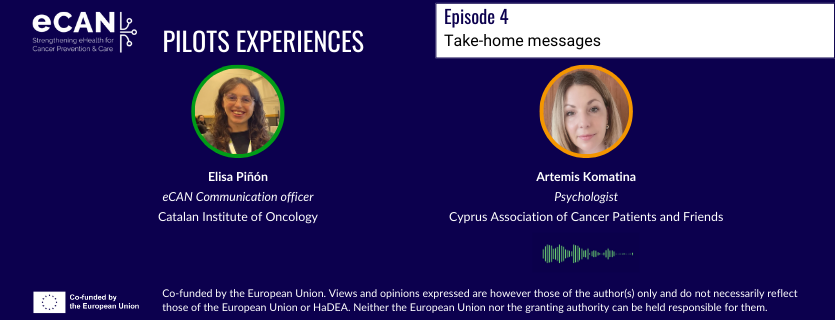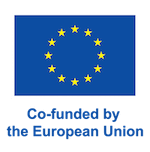Artemis Komatina, psychologist involved in the pilots: “In order to promote technology within healthcare settings, we need to start with our healthcare professionals”.
eCAN Bites is a podcast that gathers interviews with some of the healthcare professionals that have participated in the eCAN pilots. In four episodes we will try to dive into their experiences. How was to be involved in this study as a healthcare professional? What’s the patients’ feedback? How could this project change the current healthcare ecosystem in Europe?
In the fourth and last episode of this podcast, we’ve talked to four psychologists, one physiotherapist and one primary investigator. They have shared with us their reflection on these clinical trials. After all the work that has been done, now it is time to collect their feedback to start thinking about future actions. Their experience not only guide our next steps, but also help us to understand the main challenges and where our efforts are most needed. In this occasion, we’ve interviewed Vasiliki Holeva, from Greece; Sofia Adão da Fonseca and Magda Oliveira, from Portugal; Orsolya Hovart, from Hungary; and Artemis Komatina and Constantina Palala, from Cyprus. We invite you to press play and listen to their reflections on their whole experiences.
PODCAST TRANSCRIPTION
Elisa Piñón (00:05)
Hello and welcome to eCAN bites. My name is Elisa Piñón. I am the Communications Officer for eCAN Joint Action and your host for today’s episode, the last of this series.
We’d like to start the last episode of the eCAN bites by thanking all the health care professionals who took their time to talk to us and bringing the eCAN experience closer to our listeners.
Today we will explore the take-home messages these healthcare professionals highlight from their participation in this transnational project. For this last episode we’ve invited six healthcare professionals from across Europe. We have the pleasure to talk to Vasiliki Holeva, from Papageorgiou Hospital of Thessaloniki in Greece; Sofia Adão da Fonseca and Magda Oliveira, from the Portuguese Institute of Oncology in Porto, Portugal; Orsolya Hovart from the National Institute of Oncology in Hungary; and Artemis Komatina and Konstantina Palala from the Cyprus Association of Cancer Patients and Friends.
Thank you for being here today and let’s get started.
It’s so nice to have you here, Vasiliki. You are a clinical psychologist and worked with breast cancer patients, right? How do you value the experience as whole, taking into account the Greek context?
Vasiliki Holeva (01:30)
Right. It was definitely a useful experience for us, because we are under a new technological world, which was very easy to adapt and we felt that we managed to help patients that we couldn’t help otherwise, due to their condition and the severity of their illness. So my experience is positive, definitely positive.
Elisa Piñón (02:06)
The European Union is so diverse that we need to make sure all countries have equal opportunities to access these services. Does something similar happen in other contexts? Let’s ask our Portuguese colleagues. Sofia, Madga, you are physiotherapist and psychologist respectively in IPO Porto. What’s your opinion on the eCAN pilots?
Sofia Adão da Fonseca (02:27)
I think it is a really good and interesting strategy for following the patients that can’t come in person. I think this experience was really useful for us, as clinical team, as for the patients, as they showed us how they were doing with the treatment.
Elisa Piñón (02:57)
And yours, Magda?
Magda Oliveira (02:59)
I think when we look at it from a broader perspective, looking to the pluses and the minus, I think the balance it is very positive. It was a positive experience for me. I was challenged with something that need the development of your skills. And it was very, very positive that the patients were included in these pilots. We adopted a lot of games and are very happy with their participation from the start until the end. So, I think it was a good opportunity for all of us, the starting point for thinking of reflections and perspectives that these tools can bring to all of us. Thank you for the opportunity.
Elisa Piñón (03:57)
The pleasure is ours, Magda. None of that could have been possible without your commitment. I’m sure the Hungarian colleagues put the same dedication in the project. You, Orsolya, were the primary investigator from your centre in this project. How do you evaluate this experience?
Orsolya Hovart (04:14)
The eCAN Project was a really good chance to convince the patients and the healthcare professionals that the e-tools can improve the treatment and the rehabilitation of cancer patients, and the I’m quite sure that this will be the way for the future, and we both have to accept it and use it widely.
Elisa Piñón (04:41)
Thank you very much, Orsolya, lastly I’d like to get your impressions Artemis and Constantina. You both work in the Cyprus Association of Cancer Patients and Friends. What are your main highlights after participating in this project?
Artemis Komatina (04:57)
I think it is important to really find ways to inform and educate and support healthcare professionals. I know in some countries technology is widely used, but in Cyprus it is a lot more limited. And I think in order to promote technology within the healthcare settings, we really need to start with our healthcare professionals. It’s not a normal part of our everyday practise, so it’s something that we kind of need to get familiar with and get to know well and we need to appreciate its benefits in order to help our patients embrace the change and the benefits of technology.
Constantina Palala (05:44)
Yeah. Well, basically our approach will affect the willingness of the patients to incorporate like technology in their lives. So we need training.
Elisa Piñón (06:00)
We are taking notes, Constantina. While doing these interviews, I’ve heard that more than once, so we definitely have some work to do in that sense.
Thank you so much for joining me in today’s episode. This was the last of our series, I hope you enjoyed the four episodes that are available on our website and hopefully you better understand the intricacies of this exciting project after listening to eCAN bites. We definitely do it. We’ll keep you posted on our very last news.
![]() Co-funded by the European Union. Views and opinions expressed are however those of the author(s) only and do not necessarily reflect those of the European Union or HaDEA. Neither the European Union nor the granting authority can be held responsible for them.
Co-funded by the European Union. Views and opinions expressed are however those of the author(s) only and do not necessarily reflect those of the European Union or HaDEA. Neither the European Union nor the granting authority can be held responsible for them.





